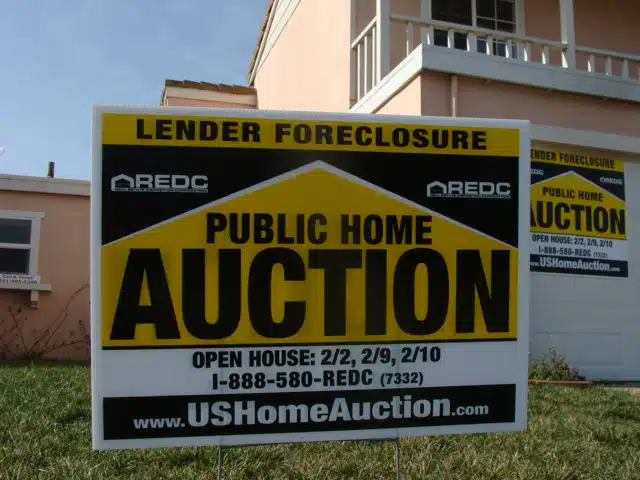What is Foreclosure?
Foreclosure is a legal process in which a mortgage lender takes possession and sells a property that the borrower has used as collateral for a loan due to the borrower’s failure to make timely mortgage payments.
When a homeowner falls behind on their mortgage payments, the lender can initiate foreclosure proceedings. The foreclosure process typically begins with a notice of default, followed by a notice of sale. During this time, the homeowner may have opportunities to halt the foreclosure, such as loan modification or repayment plans. However, there is a point in the process when it is too late to stop foreclosure.
If all available options have been exhausted and the foreclosure proceeds, the property will be sold at a public auction. Foreclosure can have serious financial and credit implications for homeowners, including a negative impact on their credit score and the potential for a deficiency judgment. Therefore, it is important for homeowners facing foreclosure to seek legal advice and explore all available options as early as possible in order to prevent or mitigate the foreclosure process.
When is it too Late to Stop Foreclosure?
Understanding the foreclosure process and its key milestones is essential for homeowners facing the possibility of losing their homes. It’s important to know when it may be too late to stop the foreclosure process and explore alternative options.
The foreclosure process typically begins with a notice of default, a formal notice from the mortgage lender stating that the borrower is behind on their mortgage payments. This is followed by a notice of intent to foreclose, which informs the homeowner that legal action will be taken if the delinquency is not resolved.
During the pre-foreclosure phase, homeowners may receive a pre-foreclosure notice, which serves as a warning that the property may eventually be sold at a public auction. This is a crucial time to explore loss mitigation options, such as loan modification or a payment plan, to try and avoid foreclosure.
However, once the foreclosure process has progressed to the public auction and a sale date has been set, it can become increasingly difficult to stop the foreclosure. At this stage, the property is typically sold to the highest bidder.
While it is never ideal to reach this point, homeowners can still consult with a foreclosure defense attorney or explore bankruptcy filing options to delay or halt the foreclosure process. However, it’s important to note that the further the process has progressed, the more limited the options become.
In conclusion, homeowners facing foreclosure should familiarize themselves with the foreclosure process and seek professional advice as early as possible. Acting quickly and exploring loss mitigation options can increase the chances of preventing foreclosure and preserving homeownership.
The Foreclosure Process
The foreclosure process can be overwhelming and distressing for homeowners who risk losing their homes. It is crucial to understand the various steps involved in this process and when it may become too late to stop foreclosure. From the initial notice of default to the potential sale at a public auction, homeowners should know the key milestones and their options for preventing foreclosure. While there may still be possibilities to explore, such as loss mitigation options or seeking legal advice, taking action as early as possible is important to increase the chances of avoiding foreclosure. This article will delve into the important aspects of the foreclosure process and provide insights into when it may become challenging to halt the process.
Notice of Default
A Notice of Default is a formal notice issued by a mortgage lender to a homeowner who has failed to make their mortgage payments on time. It serves as the initial step in the foreclosure process. This notice alerts the homeowner that they are in default of their mortgage agreement and that legal action to repossess the property may be imminent.
Typically, a Notice of Default includes key information such as the amount of delinquent payments, the deadline to cure the default, and the consequences if the default is unresolved. Homeowners must take immediate action upon receiving this notice to prevent further legal action.
Responding promptly to a Notice of Default is important as it allows homeowners to explore various options to stop foreclosure. These options may include loan modification, payment plans, or seeking assistance from housing counselors or foreclosure defense attorneys. By responding promptly, homeowners can avoid foreclosure proceedings and protect their property.
In conclusion, a Notice of Default is a formal notice issued by a mortgage lender to inform a homeowner that they have defaulted on their mortgage payments. Homeowners must respond promptly to this notice and explore all available options to stop foreclosure.
Notice of Intent to Foreclose
The Notice of Intent to Foreclose is an important step in foreclosure. The lender sends This formal notice to the borrower, indicating the lender’s intention to proceed with the foreclosure.
Typically, the Notice of Intent to Foreclose is sent after a homeowner defaults on their mortgage payments for a certain time. It contains key information such as the amount of delinquent payments, the deadline to cure the default, and the potential consequences if the default is not resolved.
Responding promptly to the Notice of Intent to Foreclose is critical. Homeowners may be able to negotiate a loan modification, set up payment plans, or seek assistance from housing counselors or foreclosure defense attorneys. By responding timely, homeowners can halt the foreclosure proceedings and protect their property.
In conclusion, the Notice of Intent to Foreclose is a formal notice sent by the lender to the borrower informing them of the lender’s intention to proceed with the foreclosure. Homeowners should respond promptly to this notice to explore their options and potentially prevent foreclosure.
Pre-Foreclosure Notice
The Pre-Foreclosure Notice, also known as the Delinquency Notice, is a crucial document in foreclosure. The mortgage lender typically sends it to a homeowner who needs to catch up on their mortgage payments. This notice is an early warning sign, providing the homeowner with important information about their delinquency and potential remedies to avoid foreclosure.
The Pre-Foreclosure Notice should contain details about the delinquent amount, the timeframe to remedy the loan default, and the consequences if the default is unresolved. Homeowners need to review this notice and understand their options carefully.
One option is to explore assistance from housing counseling agencies. These agencies can guide available programs and resources to help homeowners get back on track with their payments. Additionally, homeowners may consider negotiating a loan modification or setting up a payment plan with their lender to catch up on missed payments.
Time is of the essence when it comes to the Pre-Foreclosure Notice. Taking prompt action can make a significant difference in stopping foreclosure proceedings. Homeowners can navigate this challenging situation by seeking help, exploring available remedies, and potentially saving their homes.
Public Auction and Sale Date
After the judge signs the judgment of foreclosure and sale, the next step in the foreclosure process is the public auction and sale date. This is the homeowner’s final opportunity to prevent their property’s loss.
During the public auction, the property is sold to the highest bidder. The auction is typically conducted by a representative from the county sheriff’s office or a private auction company. The sale date is determined by state law, and it is usually set several weeks or months after the judgment of foreclosure is signed.
Once the auction is initiated, interested buyers can bid on the property. The winning bidder must provide immediate payment in cash or a certified check for the full amount of their bid. If there are no bidders or the highest bid does not cover the outstanding mortgage debt, the property may become the lender’s possession through a foreclosure sale process.
During and after the auction, both the lender and the homeowner may take certain actions. The lender may sell the property to a real estate investor or list it with a real estate agent to attract potential buyers. The lender may pursue eviction proceedings if the homeowner does not vacate the property voluntarily.
For homeowners, options may include negotiating a deed in lieu of foreclosure, in which they voluntarily transfer ownership of the property to the lender, or seeking a short sale, where the lender agrees to accept less than the full amount owed on the mortgage. However, these options should be explored before the public auction and sale date, if possible, as the availability and success of these alternatives can vary.
In conclusion, the public auction and sale date marks the end of the foreclosure process and is critical for homeowners to explore their options. Both lenders and homeowners need to be aware of the actions they can take during and after the auction to protect their interests.
Legal Process Involved in a Foreclosure Sale
Once a homeowner receives a foreclosure notice, the legal process for a foreclosure sale begins. This notice typically comes in a formal written communication, notifying the homeowner of their delinquent mortgage payments and the lender’s intention to initiate foreclosure proceedings.
After the issuance of the foreclosure notice, a certain period of time is provided for the homeowner to bring their mortgage payments current or explore alternative options, such as loan modification or payment plans. If the homeowner fails to act within this grace period, the foreclosure proceedings proceed.
During the foreclosure process, the lender will file a lawsuit to obtain a judgment of foreclosure from the court. Once the judgment is granted, the property is sold to the highest bidder. In some states, homeowners can buy back their property during the auction.
However, if the auction does not result in a sale that covers the outstanding mortgage debt, the lender may pursue a deficiency judgment. This means that the homeowner could be held liable for the remaining balance.
Throughout the legal process, homeowners must seek legal advice, explore loss mitigation options, and understand their rights and responsibilities. By doing so, they can make informed decisions to avoid foreclosure and its negative impacts on their financial future.
Mortgage Payments and Loan Modification
Mortgage Payments:
One of the main reasons for foreclosure is the homeowner’s inability to make their monthly mortgage payments. When homeowners face financial hardships, such as job loss or medical expenses, they may struggle to keep up with their mortgage obligations. Failing to make timely payments can lead to delinquency and, eventually, foreclosure. Homeowners need to prioritize their mortgage payments to prevent the foreclosure process from being triggered.
Loan Modification:
Exploring a loan modification can be a potential solution for homeowners struggling to make their mortgage payments. A loan modification involves changing the existing loan terms to create a more affordable monthly payment. This can include reducing the interest rate, extending the loan term, or forgiving a portion of the principal balance. However, homeowners must act quickly and reach out to their mortgage lender to discuss their options for a loan modification. Initiating this process early can increase the chances of reaching a favorable agreement and avoiding foreclosure. Consulting with a financial or housing counselor or seeking the assistance of a foreclosure defense attorney can provide valuable guidance throughout this process.
Monthly Mortgage Payments and Payment Plans
Monthly mortgage payments are a crucial aspect of homeownership. Making these payments on time is essential to avoid foreclosure. However, homeowners behind on their mortgage payments may feel overwhelmed and unsure what steps to take.
Fortunately, various payment plans are available to help homeowners catch up on their mortgages and avoid foreclosure. One option is loan reinstatement, where the homeowner pays off the delinquent amount and brings the mortgage current. Another option is a repayment plan, where the outstanding amount is spread over a certain time and added to the regular monthly payments.
Falling behind on mortgage payments can have serious consequences, including foreclosure. If a homeowner fails to resolve the delinquency, the lender may initiate foreclosure proceedings. This can result in the homeowner losing their home and negatively impacting their credit score.
Homeowners must explore alternative payment options with their lender as soon as they realize they are falling behind on their mortgage payments. This could include negotiating a new repayment plan or refinancing the loan. Working with a housing counselor or foreclosure defense attorney can provide valuable guidance and support throughout this process.
In conclusion, monthly mortgage payments should be prioritized to prevent the risk of foreclosure. Homeowners who find themselves behind on their mortgage should immediately explore payment plans and alternative options to help bring their mortgage current and avoid the serious consequences of foreclosure.
Loan Modification and Outstanding Debt Consideration
One key factor to address is any outstanding debt when considering a loan modification. Lenders take this into account when determining whether to modify loan terms. Here are some important considerations and potential options for borrowers:
- Review the amount of outstanding debt: Lenders will assess the total outstanding debt on the loan, including missed payments, accrued interest, and any late fees or penalties. Understanding the exact amount is crucial for negotiating with the lender.
- Present a detailed financial situation: To convince the lender to modify the loan terms, borrowers should provide a comprehensive overview. This includes income, expenses, assets, and any other outstanding liabilities. By demonstrating their ability to make modified payments, borrowers increase their chances of getting approved.
- Propose a reasonable repayment plan: Borrowers can negotiate a repayment plan with their lender to address outstanding debt. This could involve spreading the debt over a certain period or adding it to the modified monthly payments. The aim is to make the new arrangement affordable for the borrower while satisfying the lender’s requirements.
- Consider debt settlement or other strategies: Sometimes, borrowers may need to explore debt settlement options to negotiate with other creditors. This can help reduce overall debt and improve their financial situation, making it more attractive for lenders to approve a loan modification.
Remember, each lender has their criteria and guidelines for loan modification. Working with a foreclosure defense attorney or housing counselor can provide invaluable assistance in navigating this process effectively. Addressing outstanding debt during the loan modification process is essential for a successful resolution and obtaining financial stability.
Credit Score Impact During a Foreclosure Period
During a foreclosure period, credit scores can be severely impacted. This can make it challenging for individuals to obtain loans or credit in the future. Foreclosure can remain on a credit report for up to seven years, further exacerbating the negative effects.
Foreclosure on a credit report can significantly lower a credit score. This makes securing favorable interest rates on loans, mortgages, or credit cards difficult. Lenders view foreclosure as an indication of financial instability and increased risk, leading to higher interest rates or loan denials.
Additionally, foreclosure on a credit report can have long-term consequences. It can make it challenging for individuals to obtain new housing, as landlords often check credit scores before approving rental applications. It may also impact job prospects, as some employers consider credit scores during hiring.
Foreclosure can also increase the likelihood of bankruptcy. When faced with the inability to pay mortgage payments, individuals may struggle to keep up with other financial obligations, leading to mounting debt. Bankruptcy can have severe and long-lasting negative impacts on credit scores, further hindering financial recovery.
Therefore, addressing and resolving foreclosure before it severely impacts credit scores is crucial. Exploring options such as loan modifications, working with housing counselors, or seeking legal advice can help individuals find alternative solutions and avoid the long-term consequences of foreclosure on their credit scores.
Financial Resources Available During a Foreclosure Crisis
During a foreclosure crisis, individuals may feel overwhelmed and unsure of what resources can help them navigate this challenging situation. Fortunately, several financial resources are available to help those facing foreclosure, providing potential options to stop or mitigate the foreclosure process and regain stability. These resources range from government programs and financial assistance to counseling services and legal support. By seeking out and utilizing these resources, individuals can better understand their rights, explore possible alternatives, and work towards finding solutions to their foreclosure crisis.
Housing Counselors and Real Estate Investors
Real estate investors and housing counselors play crucial roles in foreclosure, offering invaluable support to homeowners facing financial challenges.
Housing counselors are certified professionals who guide homeowners through the foreclosure process. They provide personalized guidance and resources to help homeowners understand their options and navigate foreclosure’s complex legal and financial aspects. Housing counselors can assist homeowners in exploring loss mitigation options, such as loan modification or payment plans, to help them avoid foreclosure.
On the other hand, real estate investors offer alternative solutions to homeowners facing foreclosure. They can provide cash offers to purchase the property quickly, allowing homeowners to avoid the lengthy and stressful foreclosure auction process. Real estate investors can also assist in negotiating with lenders to stop foreclosure proceedings altogether.
Working with housing counselors and real estate investors has several benefits. Housing counselors bring expertise and knowledge of foreclosure laws, helping homeowners make informed decisions. They have access to financial resources and can help homeowners secure assistance programs or loan modifications. Real estate investors can offer flexible options, such as cash purchases, to provide homeowners with an immediate resolution to their financial crisis.
In summary, housing counselors provide guidance and resources to homeowners facing foreclosure, while real estate investors offer alternative solutions. Collaborating with these professionals can help homeowners navigate the foreclosure process more effectively and increase their chances of finding a positive outcome.
Mortgage Lenders and Credit Cards
When facing foreclosure, mortgage lenders and credit cards can play a significant role in a homeowner’s financial situation. Missed payments on credit cards can contribute to financial hardship, making it difficult for homeowners to keep up with their mortgage payments. This can ultimately lead to foreclosure proceedings.
Mortgage lenders, on the other hand, are the financial institutions that provide financing for homeowners to purchase their homes. When homeowners default on their mortgage loans, it can have severe consequences. Not only can it result in the loss of their home through foreclosure, but it can also harm their credit score and financial future.
However, homeowners facing foreclosure may have options and resources available to them. One potential solution is a loan modification, where the mortgage loan terms are modified to make the monthly payments more affordable. Additionally, various organizations offer assistance programs to help homeowners in financial distress.
Homeowners in danger of foreclosure must explore these options and seek guidance from housing counselors or foreclosure defense attorneys. These professionals can help homeowners understand their rights, navigate the foreclosure process, and explore potential solutions to avoid losing their homes.
While facing foreclosure, it’s crucial to seek guidance from professionals. Consider contacting HUD-approved housing counseling agencies for expert advice and support throughout the process. These agencies offer valuable resources and assistance in exploring government programs. Find a list of housing counseling agencies near you.
Conclusion:
While taking action as early as possible is always best, it is never too late to explore options and seek assistance to stop foreclosure. By understanding the various stages of the foreclosure process and the available alternatives, homeowners can make informed decisions and take appropriate steps to protect their homes. Remember, consulting with a foreclosure attorney or housing counselor can provide valuable guidance tailored to your situation. Don’t hesitate to ask for help, as it can make a significant difference in your efforts to stop foreclosure.
Navigating the foreclosure process can be overwhelming. But with timely action, perseverance, and the proper support. You can increase your chances of finding a solution that allows you to retain your home or minimize the negative impact of foreclosure. Remember, every situation is unique. And the available options may vary depending on factors such as your mortgage type, local laws, and eligibility criteria. Stay proactive, seek assistance, and explore all possible avenues to achieve the best outcome for your circumstances.
If you’re considering the potential sale of your home, use our home sale calculator to estimate the potential proceeds from your home sale. This convenient tool considers factors such as the current market value, outstanding mortgage balance, and selling costs. Understanding the possible financial outcome can assist you in making informed decisions about your next steps.
Remember, seeking professional guidance and support can make a significant difference in times of foreclosure. By exploring your options, understanding the available resources, and taking appropriate action. You can navigate the foreclosure process more confidently and potentially find a solution that aligns with your goals and financial well-being.




